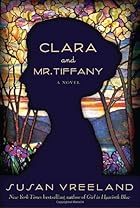 Susan Vreeland's ability to show us the intricacies of various art forms and the world of those artists is well known. I've read all her books, and I think this one is definitely her best.
Susan Vreeland's ability to show us the intricacies of various art forms and the world of those artists is well known. I've read all her books, and I think this one is definitely her best. By choosing to focus on the woman who led the "Tiffany Girls" who were responsible for the design and manufacture of the famous Tiffany glass lamps, she has given us not only the story of the glass, but the story of changing women's roles in the early part of the twentieth century. She has also given us a lesson in the glass techniques and in the Tiffany Glass company culture, particularly Tiffany's hard and fast rule that the company would not employ a married woman.
From the 1893 Chicago World's Fair where Louis Comfort Tiffany originally attracted the public's attention, to the middle of the next century, Vreeland paints the picture of Clara Driscoll, as she struggled to maintain and enhance her position in the company, to protect the jobs for the women in their own division, and to gain acknowledgement of her role and talent as the designer and main artistic inspiration for much of Tiffany's famous work. In spite of her complex and close relationship with Mr. Tiffany, she eventually was faced with standing up to the management, and ultimately leaving the company.
Vreeland uses Clara Driscoll's letters as the basis for the story of her artistic and managerial achievements at the Tiffany Glass company. That alone would have been an interesting story. However, the author's ability to breath life into her personal relationships with a very bohemian group of fellow roomers at the boarding house where she lived most of her life. Her early marriage (and subsequent widowhood which allowed her to return to working), her exotic love affair with Edwin Booth, and her lifetime relationship with Edwin's gay brother added color and depth to the story. Vreeland is also excellent at giving us a picture of the bone-crushing poverty of the average immigrant living in the tenements of New York. Clara is often able to find young women who have the native talent to learn the work and her ability to provide them with steady employment often meant the difference between living and starvation.
It's a well-crafted, well-researched story that is sure to please art-lovers, and fans of women's fiction. My experience was especially enhanced by Ms. Vreeland's post Discovering Clara on her webpage. Be sure to check out the breathtaking photos of the stained glass.
Publisher-Format: Random House (2011), Hardcover, 432 pages
Subject: Tiffany stained glass, women's roles
Setting: New York City
Genre: historical fiction
Source: Public library







I must read this book. A church near us has several Tiffany windows. (Obviously the early congregation consisted of very wealthy people.) This is a segment of women's history I don't know much about.
ReplyDelete